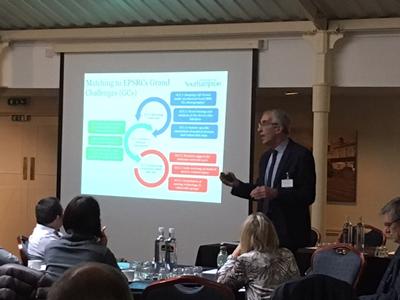The Medical Devices and Vulnerable Skin Network Announces Funding Call to Develop Novel Medical Device Designs to Minimise Trauma to Vulnerable Skin Tissues

Application deadline: Friday 16th December 2016 - Successful applicants will be notified by 31st January 2017
The third event of our Medical Devices and Vulnerable Skin Network took place on Thursday 20th October 2016. The event attracted 70 multidisciplinary delegates including academics, healthcare practitioners and industrialists to discuss a range of research themes encompassing functional medical devices and sensing technologies to improve patient safety.
Dan Bader, Professor of Bioengineering and Tissue Health, Faculty of Health Sciences at University of Southampton and Principal Investigator of the MDVSN opened the event with a review of the activities of MDVSN to date, the aims of MDVSNPLUS and announced details of a series of calls to fund feasibility studies aligned with the Network’s core aims.
The funding remit is broad and provides an opportunity to develop novel designs leading to more effective performance of medical devices which will minimise trauma to vulnerable skin tissues. Submissions involving joint applications from different sectors will be encouraged.
MDSVNPLUS will provide support up to approximately £50k per project. This is designed to support staff and consumables costs up to a maximum of 12 months. We will also consider smaller funds for proof of concept studies typically up to £10k per project.
Each application will be considered by a panel of Network partners with an independent chairperson. Consideration will be paid to how closely the research proposal matches the EPSRC Grand Challenges. MDSVNPLUS will consider applications in three separate calls over the lifetime of MDSVNPLUS.
The funding application form can be downloaded below.
Other key note speakers included:
- Professor Stephen Morgan, Professor of Biomedical Engineering, University of Nottingham presented on sensing elements embedded within medical devices to detect early signs of damage
- Professor Ralph Sinkus, Chair in Bioengineering, King's College London explored tissue biomechanics via waves: application to cancer, neurodegenerative diseases, and mechanotransduction
- Dr Stephen Oakeshott, Programme Manager, Translational Research, Medical Research Council talked about MRC funding opportunities for medical device development
- Mike Clancy, Director, Medstrom Healthcare explained how working with the MDVSN has driven product innovation
- Professor Patricia Grocott, Professor of Nursing Technology and Innovation, King’s College London presented on technologies and systems for people vulnerable to skin breakdown
- Dr Elena Mancuso, Research Fellow, IMPRESS Network discussed breaking barriers in skin sensing assessment
Notes for editors
Following the success of the current EPSRC-NIHR HTC Partnership Award: Medical Devices and Vulnerable Skin: Optimising safety in design, 'PLUS' funding has been secured starting on the 1st of July 2016 and ending on the 30th June 2019. This funding will overlap with the current MDVS network in 2016-2017 and provide the basis to expand our outreach to academic, industrial and clinical partners.
The global aim of the MDVSNPLUS: Intelligent sensing to promote self-management is to bring disruptive technologies to the medical device market to promote sustainable evolution and long-term healthcare improvements. MDVSNPLUS will work with these partners to produce cost-effective functional medical-device and sensing technologies and novel materials and designs that can minimise the risk of damage to vulnerable tissues to improve patient safety.
The ‘PLUS’ Network will fund a series of feasibility studies aligned with our core aims and target one or more of three EPSRC Grand Challenges; (i) Optimising Treatment (ii) Frontiers of Physical Intervention (iii) Transforming Community Health and Care. Each potential proposal will be reviewed by an independent innovation panel and assessed based on the clinical need and feasibility to translate the research findings to clinical practice.